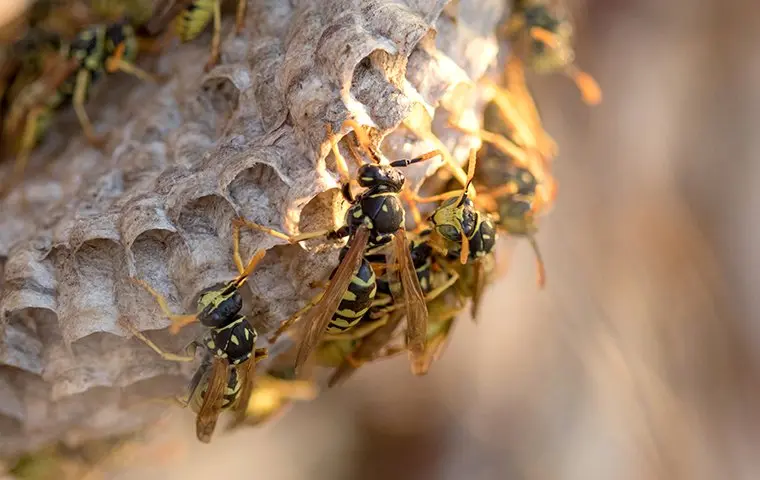There are so many types of wasps with different tendencies and habits that it can be difficult to know how to react when you see wasps in your backyard. As always, with pest control, learning about your pest and what makes them tick is the first line of defense. However, when you have a wasp infestation, you may be floundering as you figure out a safe way to deal with them. Pest control may be the only way to deal with an active infestation, but it isn’t too late to learn more about these pests and why they’ve chosen your yard to inhabit. For more information about the paper wasp, the dangers and risks they pose to you, and how to prevent and get rid of them safely, continue reading.
What Do Paper Wasps Look Like?
Even among the sub-category of paper wasp, there is some variation. For the most part, paper wasps are brownish with yellow markings and almost metallic in appearance, but they can have reddish markings. They can grow up to ¾ of an inch and have long legs. For some, it can be difficult to identify a wasp as opposed to other stinging insects. The paper wasp is no different from other wasps in its most unique characteristic: its waspish waist. Wasps have a very small, thin connection between their thorax and their abdomen, hence the term “waspish” for a very small waist.
Another way to practice wasp identification without getting too close to one is through their nest. Paper wasps chew cellulose to make their nests, which is how they get their name. Their nests look like paper, and they are typically an upside-down umbrella shape in which you can see the individual combs.
How Dangerous Are Paper Wasps?
Paper wasps in and of themselves are dangerous because they are stinging insects capable of causing painful welts and potentially life-threatening allergic reactions to those who are susceptible. They are not nearly as aggressive or dangerous as some other wasp species, but this doesn’t mean you shouldn’t take them seriously as a threat.
Five Paper Wasp Prevention Tips
Like most wasps, paper wasps are carnivores and sweet lovers. They will eat other insects around the yard as well as discarded food from your trash or gatherings. They also eat honeydew, sap, fruit, and nectar from trees and flowers. If you have a thriving garden, wasps may just be a way of life. Getting rid of the things that attract them, like food, water, and suitable shelter, is the best form of wasp prevention. To do this, try these five tips:
- Trim your yard often. Long grass is a great breeding ground for all kinds of insects wasps prey on.
- After cooking or eating outside, clean up crumbs and spills immediately.
- Store outdoor trash in a sealed container away from your property.
- Repair anything causing excess moisture around your yard, including clogged gutters, leaking pipes, and landscaping issues.
- Plant strong-smelling herbs in your garden like basil, mint, lemongrass, citronella, and thyme. Also, stick to warmer colored flowers.
Minimizing attracting factors can go a long way toward keeping wasps of all kinds out of your yard, but it may not be enough to get rid of an existing population.
The Safest Form Of Wasp Control
Wasps are probably one of the pests most often inappropriately dealt with by people who underestimate them. Many have taken to trying to drown, suffocate, or light on fire any wasp nest around their home while mistakenly assuming they won’t get hurt in the process. In reality, the best way to get rid of a wasp nest and eliminate wasps in your yard is with professional pest control through Innovative Pest Solutions.
With several pest control protection plans to choose from, you can customize your level of protection based on the needs of your household. If wasp removal is all you need, we can customize your treatment to protect your home and yard from these stinging insects. At Innovative Pest Solutions, thorough, quality care and inspections are a part of our commitment to you. After getting your free estimate, you can schedule an inspection to help determine not only the extent of the pest problem you’re dealing with but also why they’re flocking to your home. During and after treatment, we will continue to work with you to keep your Raleigh home pest-free for a long time to come. For long-term pest relief, prevention, and treatment, call Innovative Pest Solutions today.





